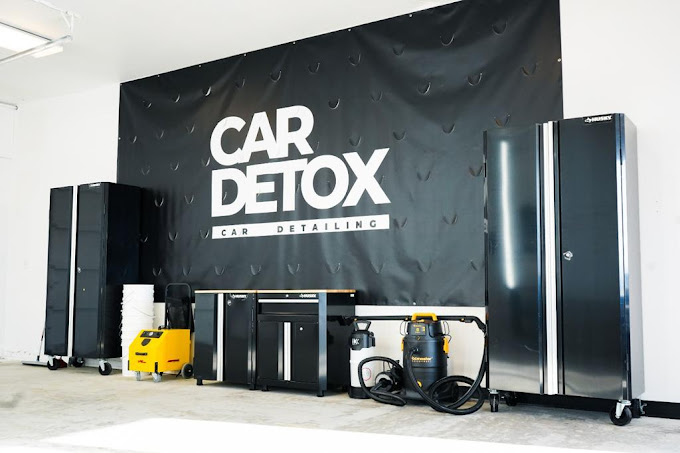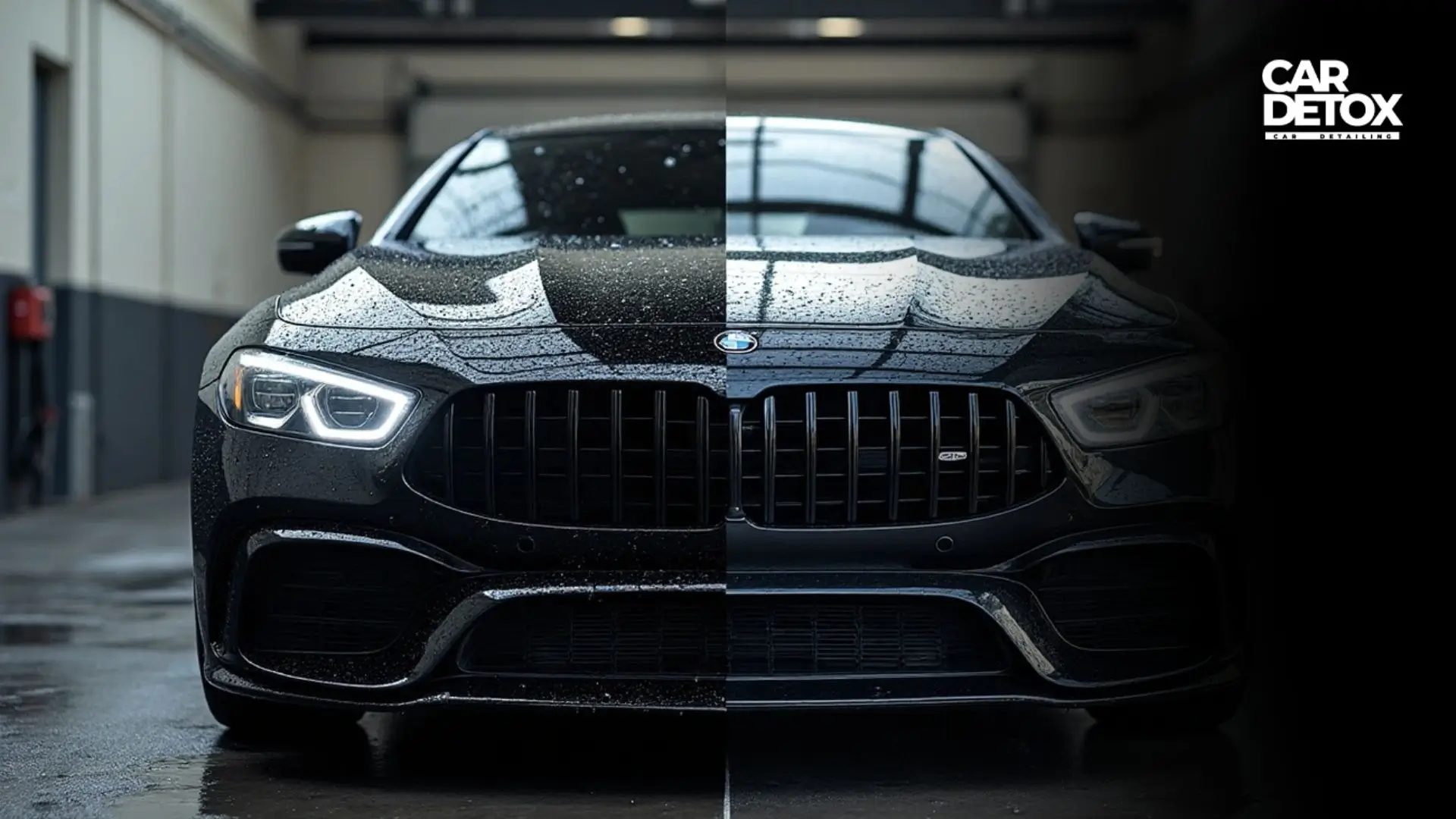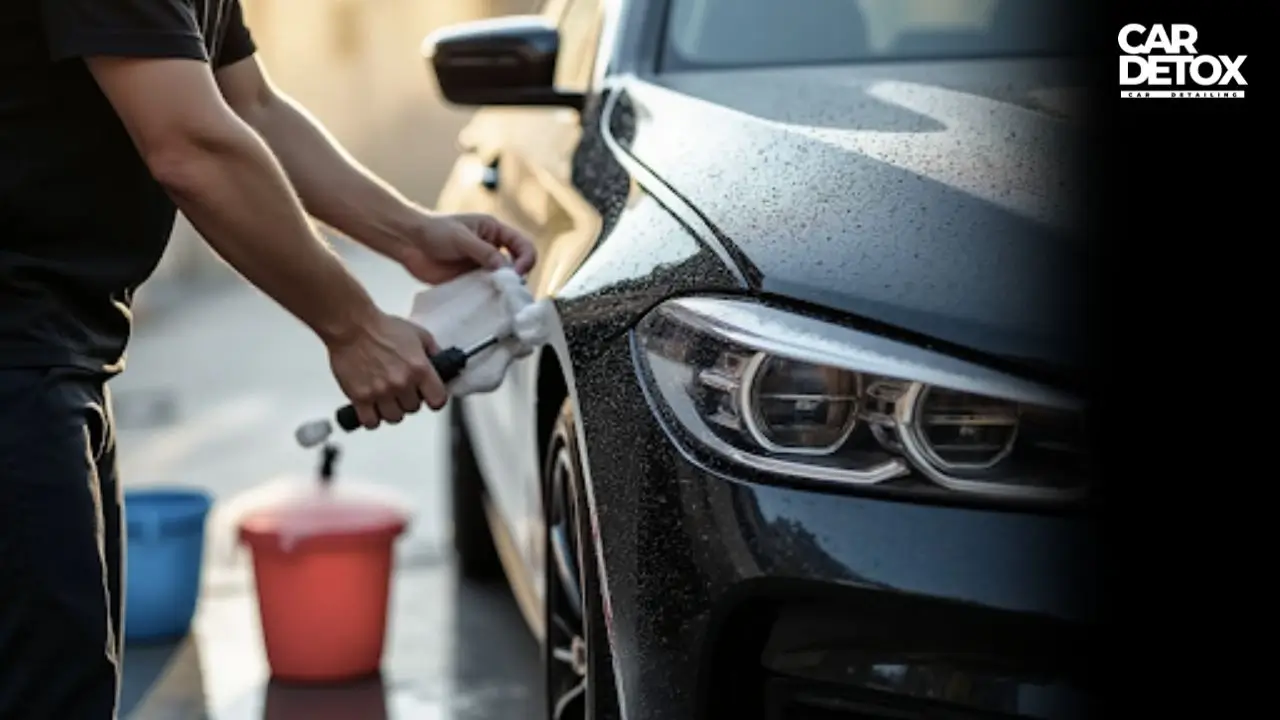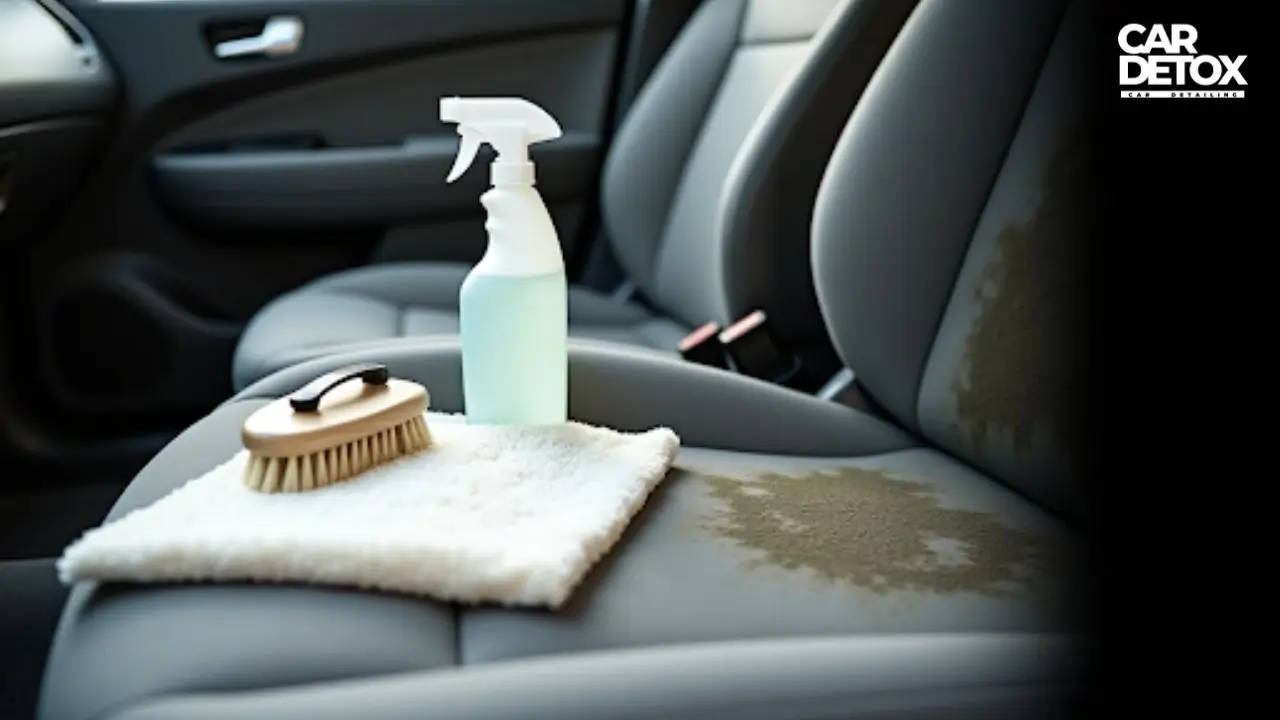"How often should I wash my car?" This question goes beyond looks—it's about protecting your investment. Most experts suggest washing your vehicle every two weeks to keep up its appearance and value. But many car owners don't realize just how important regular cleaning really is.
Your car suffers when you skip regular washes. Dirt, grime, and environmental contaminants pile up and create scratches, stains, and rust damage to your car's exterior. A clean car also helps your mental well-being. People feel more confident and professional when they drive a spotless vehicle.
This detailed guide will show you the best times to wash your car and help you plan your winter and summer maintenance. You'll learn what mobile car detailing is and why busy car owners might want to think about this service. Mobile detailing brings professional cleaners right to you. It saves time compared to regular car washes and gives you a full cleaning inside and out.
Why Regular Car Washing Matters
Regular car washing isn't just about making your vehicle shine—it's a vital part of proper maintenance. A consistent cleaning schedule protects your investment for years to come. Let me explain why washing your car matters more than you think.
Protects paint and finish
Your car's paint acts as the first defense against the elements. Dirt, grime, and debris build up on your vehicle's surface and create tiny scratches that wear down the paint. These contaminants can destroy your paint and damage the metal body underneath.
The environment poses real threats to your vehicle's exterior. Bird droppings, tree sap, road salt, and pollution contain acids that eat away at your paint if you don't clean them off. The sun's UV rays will make your paint fade and lose its shine.
You can prevent permanent damage by washing these harmful substances away quickly. Adding protective coatings creates another shield against these threats. As one expert notes, "A clear-coat helps protect the vehicle's paint from the damaging effects of ultraviolet (UV) rays from the sun, moisture and oxidation that fade paint". These treatments make washing easier because contaminants can't stick to the paint's surface as easily.
Improves resale value
A clean car puts more money in your pocket when you sell or trade it in. Research in the Journal of Consumer Psychology shows buyers will pay up to 10% more for a clean car versus the same model that's dirty. A University of Texas at Arlington study found well-kept vehicles can sell for 20% more than those in average or poor condition.
First impressions make a huge difference when selling a car. Kelley Blue Book's survey found 77% of people believed a clean, well-maintained car would sell for more than a dirty one. This isn't just about looks—a spotless car shows buyers the whole vehicle has been taken care of.
Washing your car regularly prevents damage that could cut into its value. One automotive expert explains, "If you check vehicle valuation sites like Kelley Blue Book, there can easily be a 20% difference in an above-average-condition vehicle ranking versus fair or poor condition".
Enhances driving experience
A clean car makes your time behind the wheel better. Clear windows, mirrors, and lights help you see better—especially in bad weather or at night. Dirty, smudged windshields can block your view of the road and create unsafe driving conditions.
Here's something interesting: a clean car might save you gas money. One test showed a clean car got about 2.4 more miles per gallon than a dirty one because it cut down on drag.
Don't overlook the mental benefits of driving a clean car. The International Detailing Association's research shows a clean, tidy vehicle interior boosts your mood, mental state, and driving performance. A clean space helps you stay calm, cuts stress, and keeps you focused while driving.
Many drivers say their cars run better after a wash. While this might be mostly in their heads, that good feeling leads to a better driving experience. One expert puts it this way: "A clean car gives off a sense of pride and accomplishment, contributing to a positive mood while driving".
How Often Should You Wash Your Car?
Your vehicle's perfect washing schedule might feel like a guessing game. All the same, experts gave an explanation with clear guidelines to help you keep your car in prime condition without overdoing it. Let's head over to the specifics of how your car needs washing throughout the year.
General rule of thumb
Automotive experts agree that washing your car every two weeks stands as the standard recommendation. This biweekly schedule works well under normal wear and tear circumstances and stops harmful contaminants from building up on your vehicle's surface. This schedule applies year-round—with some seasonal adjustments.
The two-week interval creates an ideal balance between protection and practicality. Your car stays protected from damaging elements, and the schedule fits into most people's busy lives. Many factors can change this guideline.
Factors that affect frequency
Your car washing schedule might need adjustments based on these variables:
- Environment and location - Cars near the ocean or on salt-treated roads need more frequent washing to prevent premature rusting.
- Storage conditions - Garage-kept vehicles can go longer between washes than those exposed to the elements.
- Driving habits - Daily commuters collect more dirt and grime than weekend drivers, so they need more regular cleaning.
- Parking location - Tree sap and bird droppings affect cars parked under trees or in areas with high bird activity, requiring more frequent washing.
- Personal preference - Some drivers love the look of a freshly washed car at all times.
Your vehicle might need immediate washing, whatever the schedule, after contact with bird droppings, tree sap, or road salt. These substances can damage paint if left on too long.
How often should I wash my car in the winter?
Winter creates unique challenges for vehicle maintenance. The cold season typically requires more frequent washing than summer. Roads treated with salt and de-icing chemicals mean your car needs washing every 10 days. Some experts suggest weekly washing during harsh conditions.
Underbody sprays become vital during winter washes. Salt and debris collect underneath your vehicle and can cause significant rust damage. Consumer Reports recommends monthly car washes during snow season—or more if salt is visible—with careful attention to undercarriage cleaning.
Best results come from washing on mild winter days between 45-60 degrees Fahrenheit with no snow or rain forecast. This temperature range helps proper cleaning and drying without leaving residue.
How often should I wash my car in the summer?
Summer brings its own challenges with intense UV rays, dust, pollen, and insect residue. The biweekly standard works well during these months, though conditions might require changes.
Heavy pollen periods might call for weekly washing to stop yellowish coating from damaging your paint. Beach trips demand immediate washing since salt sticks to your car's undercarriage and wheels, potentially causing rust.
Your car needs prompt washing after rural or construction area road trips. Bugs, tar, and road dust stick firmly to your car's surface when left too long. Summer heat speeds up paint damage from these contaminants, making quick cleaning important.
Note that washing works best during early morning or evening hours in summer, or on cloudy days. This prevents water spots from quick drying in direct sunlight.
Best Times and Conditions to Wash Your Car
The right timing makes a huge difference in keeping your car clean. Your vehicle's finish can end up spotless or covered in streaks and water spots based on when you choose to wash it.
Best time to wash car during the day
Most people think midday works best for car washing, but that's not true. Summer car washes work better during early morning or evening hours with moderate temperatures and less direct sunlight. This stops soap from drying too fast on your car's surface.
Winter changes everything about car washing timing. Your car should be washed earlier in the day above freezing temperatures. This lets it dry naturally as the day warms up. Several automatic car washes suggest midday winter washes since afternoon sun helps dry vehicles and keeps parts from freezing.
Avoiding direct sunlight and extreme temperatures
Your car's appearance suffers from washing under intense sun. The heat makes shampoo dry faster than you can rinse it off, which leaves tough water spots and soap stains. The bright sunlight also makes it harder to spot dust and grime, so you end up with patchy cleaning results.
Extreme temperatures create their own challenges. Hot weather reduces snow foam pre-wash treatments' effectiveness because heat pops the bubbles too soon, so they can't stick to and remove dirt. The opposite happens in freezing weather - warm water hitting cold glass can crack your windshield from the stress.
After rain, snow, or long drives
Rain doesn't clean your car - it actually causes damage. The rainwater carries pollutants and acid that can harm your paint. A quick wash after rainfall removes these harmful substances before they damage your car's finish.
Winter driving requires extra care. Road salt and de-icing chemicals stick to your car's undercarriage and speed up rust formation. Getting professional undercarriage cleaning after snow exposure helps remove these damaging materials before permanent damage sets in.
Your car should cool down after long drives before washing. Cold water hitting hot brakes might warp the rotors. A 15-20 minute wait until the paint feels cool usually does the trick. This approach gives you the best results without risking damage to your car's parts.
Can You Wash Your Car Too Often?
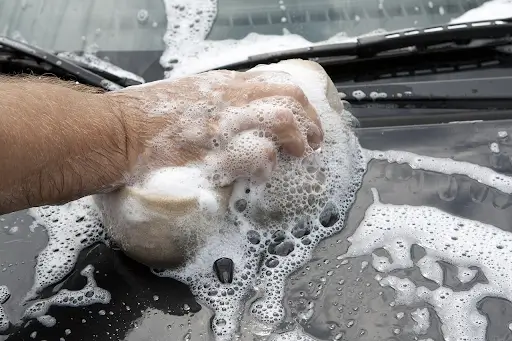
Car enthusiasts often ask if their passion for keeping their vehicles clean might do more harm than good. The answer isn't as simple as most people think.
Understanding over-washing myths
Experts don't agree when it comes to over-washing cars. Some say daily car washing is perfectly fine with the right approach. "If you do it right, the short answer is NO," a professional car wash service points out.
In stark comparison to this, other experts warn about washing too often. Some sources suggest frequent washing can fade paint, create scratches, lead to mold from poor drying, and even harm engine parts if water gets in. These issues show why learning proper techniques matters more than just limiting how often you wash.
Safe washing frequency with proper tools
Your methods and materials make all the difference in safe, frequent washing. DIY washing with the wrong tools brings more risks than professional services. Your car's finish can get damaged when you use harsh household cleaners instead of products made for cars.
Professional car washes use gentler equipment and special products that let you clean more often without damage. Yes, it is true that automatic washes with soft-touch materials protect your car better than many DIY methods.
Here's what you need to know about safe hand-washing:
- Always use clean, soft cloths or sponges
- Choose car-specific cleaning products
- Use gentle circular motions
- Rinse well to avoid soap residue
How often can you wash your car without damage?
No single rule exists for how often you should wash your car. Experts agree that you can wash as often as you want if you use the right techniques.
Most people find washing every two weeks works well, but weekly or more frequent washes won't hurt your car if done right. The real focus should be on your car's specific needs based on how you drive, where you park, and what kind of dirt it faces.
Note that rough automatic washes with harsh materials can damage your car over time. Quality professional services with good equipment and products let you wash more often safely.
Going Beyond the Wash: Detailing and Protection
Your car needs more than just washing to keep its looks and value. Professional detailing and protective treatments will restore your car's shine. They also provide lasting protection against environmental damage.
What is mobile car detailing?
Mobile detailing brings professional car cleaning right to your doorstep—at home, work, or anywhere else. You don't need to drop off your vehicle at a shop. Mobile detailers come to you with their specialized equipment. The service has everything from deep exterior washing to waxing, polishing, interior hoovering up, shampooing, and engine bay cleaning. This saves you valuable time while getting professional results.
Benefits of waxing and ceramic coating
Waxing and ceramic coating give you protection that goes beyond simple washing:
Wax puts a sacrificial barrier on your paint. It creates a warm, glossy finish and gives moderate protection from UV rays and minor contaminants. You'll need to reapply it every 2-3 months.
Ceramic coating isn't a match for regular wax. It creates a semi-permanent chemical bond with your car's paint. This silicon dioxide-based protection makes a hydrophobic surface that repels water. It promotes beading action to stop streaks and stains. Most ceramic coatings last 6 months to 5 years if maintained properly. They cost more upfront but last longer.
Interior cleaning and odor removal
Interior detailing does more than just vacuum. It tackles embedded odors and stains at their source instead of masking smells with air fresheners. Detailers use steam cleaning, enzyme treatments for stains, and ozone treatment. Ozone breaks down odor molecules at a molecular level rather than just covering them up.
Experts suggest using removable, washable seat covers and regular deodorizing treatments for stubborn pet odors.
When to think about professional detailing
Your car needs professional detailing at least once a year to stay in good shape. Some situations need expert help:
- After harsh weather exposure
- Before selling your car (it might increase resale value)
- When DIY cleaning can't remove tough stains or smells
- To get specialized treatments like paint correction or ceramic coating
Professional detailers use specialized equipment. Their steam cleaners, dual-action polishers, and ozone generators get better results than typical DIY methods.
Conclusion
This piece explores how regular car washing protects your investment beyond just making it look good. A consistent washing schedule—typically every two weeks—protects your vehicle's paint, boosts its resale value, and makes driving more enjoyable. Your specific circumstances should determine how often you wash, including your local environment, seasonal challenges, and driving habits.
At Car Detox, we emphasize that the right washing techniques matter more than sticking to a strict schedule. You'll prevent damage and keep your vehicle looking great by using quality products and proper tools in the right conditions. Summer washing works best in the early morning or evening, while winter washing needs warmer midday temperatures above freezing.
Professional detailing services from Car Detox provide complete care that extends your vehicle's life and looks. Waxing gives short-term shine while our ceramic coating services offer long-lasting protection. These extra steps significantly improve your car's defense against environmental damage—whether it's sun, salt, or pollution.
Regular car washing goes beyond pride in appearance—though that benefit exists. With expert support from Car Detox and a systematic care routine, you'll protect your car's value and enjoy a cleaner, safer, and better driving experience for years to come.
FAQs
Q1. How often should I wash my car?
As a general rule, washing your car every two weeks is recommended. However, this frequency may need to be adjusted based on factors like your local environment, driving conditions, and personal preferences.
Q2. Is it possible to wash my car too frequently?
No, you can't wash your car too often if you use proper techniques and car-specific products. Frequent washing with gentle methods and appropriate cleaning materials won't damage your vehicle's paint or finish.
Q3. What's the best time of day to wash my car?
The ideal time to wash your car is early morning or evening when temperatures are moderate and there's minimal direct sunlight. This prevents soap from drying too quickly on the surface and reduces the risk of water spots.
Q4. Should I wash my car after it rains?
Yes, it's advisable to wash your car after it rains. Rainwater contains pollutants and acidic compounds that can damage your car's paint if left untreated. Promptly washing removes these harmful residues before they can cause lasting damage.
Q5. What are the benefits of professional detailing?
Professional detailing offers comprehensive care that extends beyond regular washing. It includes thorough cleaning of both exterior and interior, paint correction, application of protective coatings, and specialized treatments that can significantly enhance your car's appearance and longevity.
Our Popular Services
Car Detailing Services | Ceramic Coating Services | Pet Hair Removal Services | Mobile Auto Detail Services Happy Valley | Car Detailing Services in Tualatin
Find Us On Map
Car Detox - Auto Detailing Services
Book An Appointment
Read More on
How Long Do Interior Ceramic Coatings Last?
Is Ceramic Coating Better Than Wax?
How to Find the Best Ceramic Coating Installer Near Me
How long does ceramic coating take to cure?
Revive your ride anytime, anywhere
Schedule AppointmentQuestions? Call us now!


